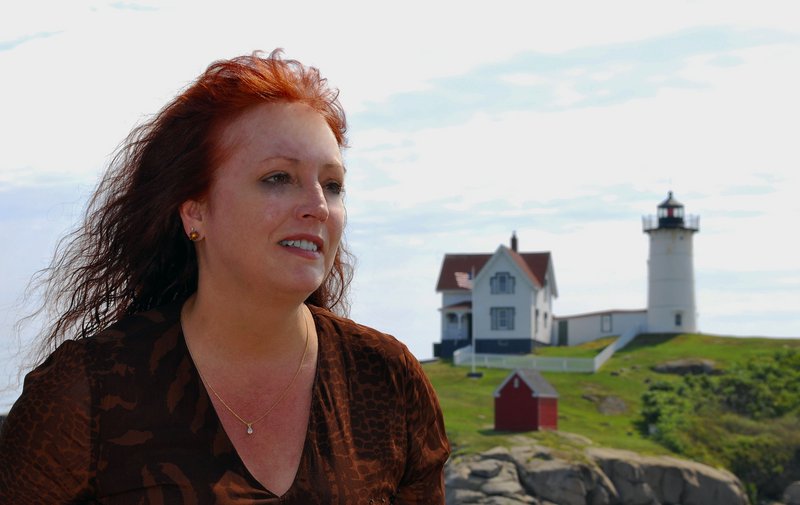Jayne A. Hitchcock, a cybercrime expert and victims’ advocate, can tell you a lot of scary stories about the Internet.
You could argue that her latest book, “True Crime Online: Shocking Stories of Scamming, Stalking, Murder and Mayhem” (CyberAge Books, $14.95), should be required reading for anyone who’s hooked on Facebook and other social media sites.
From casual encounters that lead to years of stalking, to a bizarre underworld of cannibals who go online to find people who want to be eaten (yes, you read that right), Hitchcock has gathered cautionary tales of every stripe into one book.
Hitchcock was born in Saco and lived for a while in New Hampshire. She and her husband, a U.S. Marine, traveled to California, Japan and Maryland before finally settling in York, where they have lived for the past 15 years.
Hitchcock volunteers with the U.S. Department of Justice Office for Victims of Crime and the National Center for Victims of Crime. She conducts law enforcement training seminars on cybercrime, gives lectures at schools and conferences, and has been interviewed on TV shows such as “America’s Most Wanted,” “48 Hours,” “Primetime” and “Good Morning America.”
She also serves on the editorial board of the International Journal of Cyber Crimes and Criminal Justice, and is president of “Working to Halt Online Abuse” (haltabuse.org). This is her 10th book.
Q: How did you get interested in this topic? Were you a victim yourself?
A: Yep. Back in 1996, back before cyberstalking was a word, before law enforcement even knew what the heck was going on online, I had just moved back from Okinawa, Japan, to Maryland. I published six books over there, and they do publishing differently, so I was looking for an agent or publisher here. They had newsgroups back then. They didn’t have Google or Facebook and all that kind of stuff.
On the writing group, I answered a post from someone claiming to be a literary agency and got them interested in one of my books. They sounded a little off. Something just didn’t seem quite right with them. So I posted on the newsgroup, asking if anybody had any dealings with them, and I got people privately emailing me saying they had paid them money. The initial (payment) was a reading fee, and then it was a contract fee, a manuscript fee — they just kept coming up with fees. One woman paid over $1,400 before she realized it was probably a scam. The agency was supposedly just outside New York City. I contacted the attorney general there and said, “Hey, I know a bunch of writers who are getting scammed. What can I tell them to do?” And they said, “Well, if you can get more victims or a higher dollar amount, then we’ll do an investigation.”
I posted on the group, “If you paid these people money, let me know. There might be an investigation.” And I started getting a bunch of people and put together everything and sent it off to the attorney general’s office. That was in September of 1996. Then somebody began impersonating me online, on newsgroups in December, calling people a bunch of idiots. And then in January, they began posting again as me on sadomasochistic and sex-related groups, claiming that I was doing a book about sadomasochistic fantasies and looking for stories, and I could be contacted any time of the day or night, and they listed my home phone number and address.
I started getting phone calls from all over the world. One guy from Germany, he said his name was Dieter and he wanted to learn English and exchange fantasies and left me his beeper number, fax number, office number, home number — you name it, he gave me numbers. I got scared, thinking, if people are going to call me from all around the world, what’s going to stop somebody from knocking on the door?
Q: What happened to the person who was victimizing you?
A: It turned out to be a husband-and-wife team. The people who ended up finally arresting them — because all I could do was file a civil suit because there were no laws in place — was the U.S. Postal Inspection Service. They arrested them in 2000, and they got them on mail fraud, because a lot of the writers had sent checks or money orders through the postal mail.
I did not know at the time that the postal inspection service were bulldogs like that. It turned out the husband had quite a record, and the wife was just nasty. When they went before the judge for sentencing, the judge looked at him and said, “If I could give you more time, I would, for what you did to this woman.” He could only give him eight months in jail and three months probation, and he gave her three years probation because she had no criminal record.
Q: Is law enforcement more sophisticated about this kind of thing now?
A: A majority are. When it comes down to the victims, there’s luck of the draw, hoping that somebody in the department, whether it’s local, county or state, know what they’re doing or they have somebody who knows what they’re doing. And then if they end up going to court, it’s hoping that the judge understands.
I just had a woman I was in touch with last week, and she ended up having her case thrown out of court because the judge didn’t understand how the Internet could be used against anybody — even though the two people involved confessed, said that yes, they had been bothering her online and harassing her online. And the judge said, “I just can’t see it. Stay off the Internet.” And tossed it out.
Q: What are the three biggest mistakes people make online that compromise their security?
A: That they’re too trusting. They’re looking at a computer screen. They don’t see a face, they don’t hear a voice. They don’t know who they’re dealing with. They’re believing what they’re being told, and believing they’re in touch with that person.
Q: Anything else? Are there practical things you can do?
A: The best thing to do, especially if you’re on Facebook or other social networking sites, is to make sure that the people you are friends with are really friends that you know, not somebody that you went to high school with years ago and are not really in touch with.
That was one of the cases I wrote about in the book, where she posted on Facebook that she was going to a concert that night and came home and found out that somebody had broken into her house. But luckily, her laptop caught video of it, and it turned out to be a guy that she friended that she used to go to high school with, but she didn’t really know him.
He saw the post, and it wasn’t very hard to find her. So be very, very wary. And if you still want to post, keep it generic or wait until after the event and say, “Hey, I went to see Bruce Springsteen last night. It was a great concert.” Don’t post that you’re going to be away.
Q: What’s the strangest story you’ve run across? That chapter on the cannibals was pretty weird.
A: (Laughs.) Every media person I speak to, they talk about that. That’s the one I get asked about the most, and it just cracks me up.
Q: Are most stories in the stalking/burglary category?
A: Yeah, and then you have the ones where people actually kill, like the Craigslist killer. He went on Craigslist for so-called masseuses and ended up killing several women. Then you have the bullies when you get into kids and teens, and they’re beating up people and posting videos of it. It’s a little bit of everything.
Q: What are the top three things parents can do to protect their kids?
A: Know where your kids are going online. Know what they’re using. If they’re on Facebook, either you’ve got to be on Facebook or you’ve got to have at least a working knowledge of it. Have them show you. Now the kids are kind of drifting a little bit away from Facebook, and they’re going to Snapchat. There’s Kik. Instagram. Start educating yourself about what is out there and what kids are doing.
Just say, “Hey, that looks like a cool website, you’re on, what is that?” Just ask, because kids love to show off. And if you don’t have a Facebook account or you want to get one, just say, “Can you help me start up this profile? I don’t know what I’m doing.” And kids will help.
And then just be very open with your kids and talk with them … Don’t make them feel like they’re going to be punished for coming to you because they accidentally clicked on a link and went to a porno site or some stranger is contacting them on Facebook or sent them nasty photos on Snapchat. It’s not their fault.
You’ve got to make sure that no matter how upset you are with the situation, don’t take it out on the kids. Work with them. Sit down and say, “OK, let’s see what’s going on here. OK, we can contact Snapchat, we can contact Facebook. Let’s block this person.” Just be very open, and listen to your kids.
Staff Writer Meredith Goad can be contacted at 791-6332 or at:
mgoad@pressherald.com
Twitter: MeredithGoad
Send questions/comments to the editors.





Success. Please wait for the page to reload. If the page does not reload within 5 seconds, please refresh the page.
Enter your email and password to access comments.
Hi, to comment on stories you must . This profile is in addition to your subscription and website login.
Already have a commenting profile? .
Invalid username/password.
Please check your email to confirm and complete your registration.
Only subscribers are eligible to post comments. Please subscribe or login first for digital access. Here’s why.
Use the form below to reset your password. When you've submitted your account email, we will send an email with a reset code.